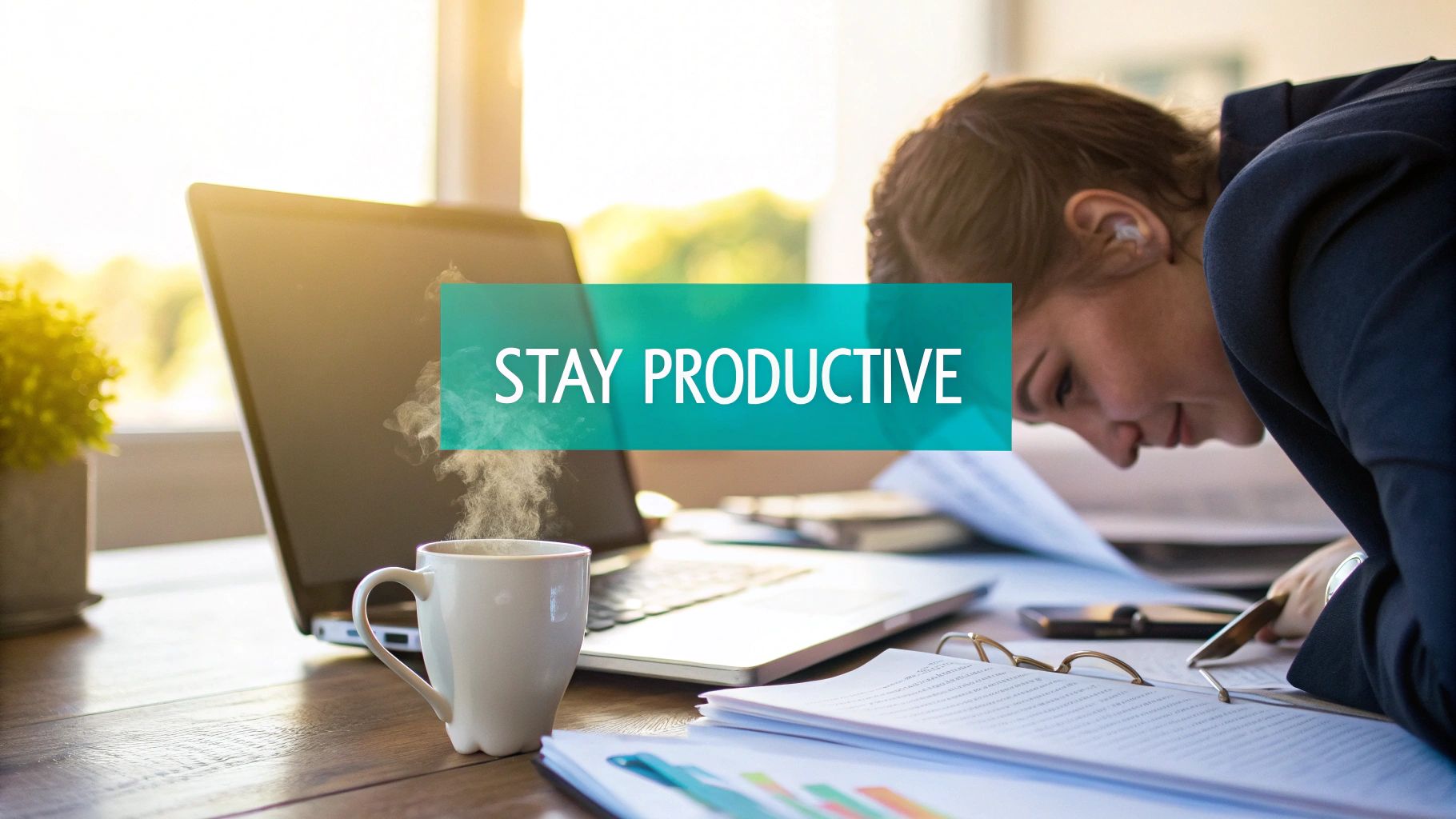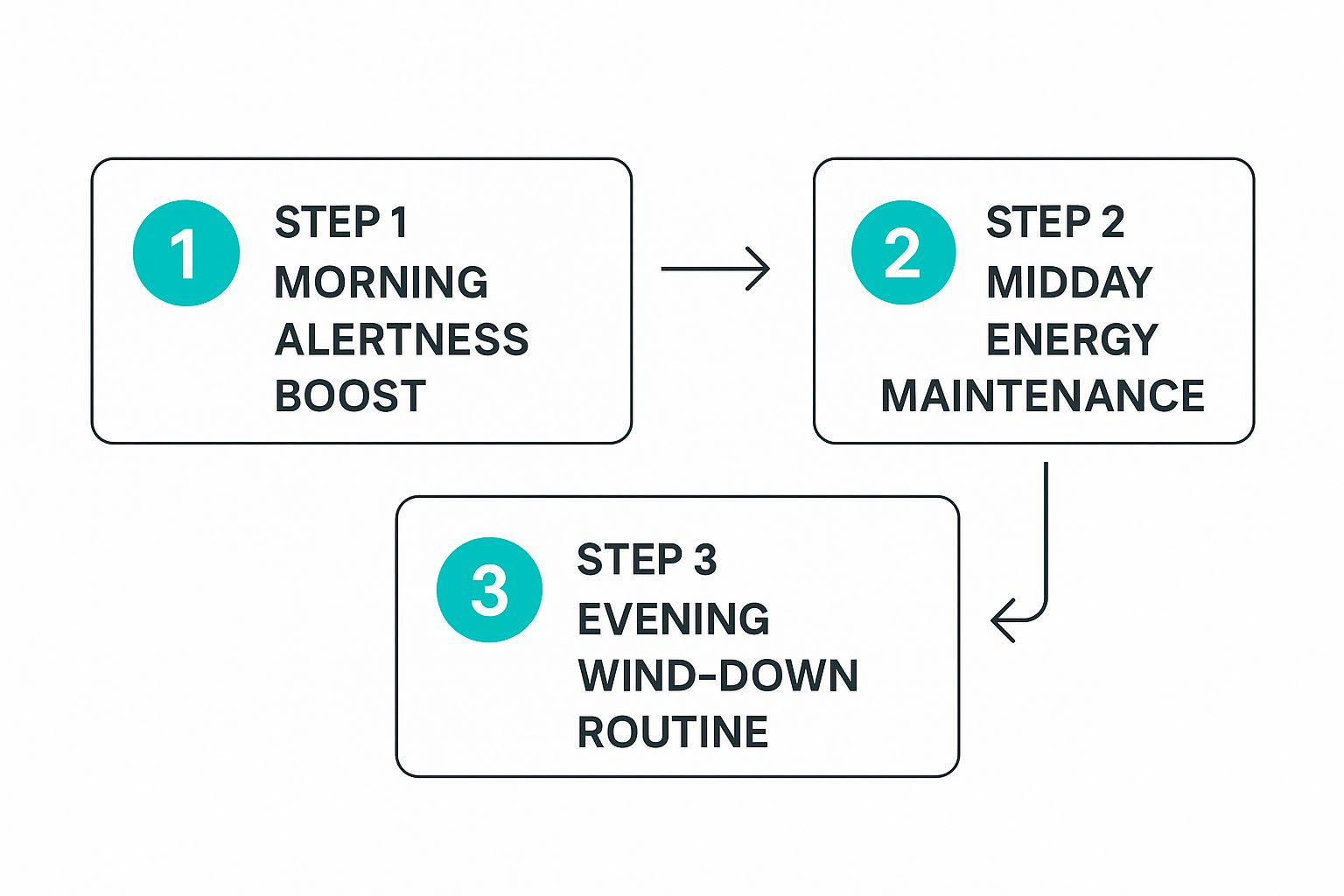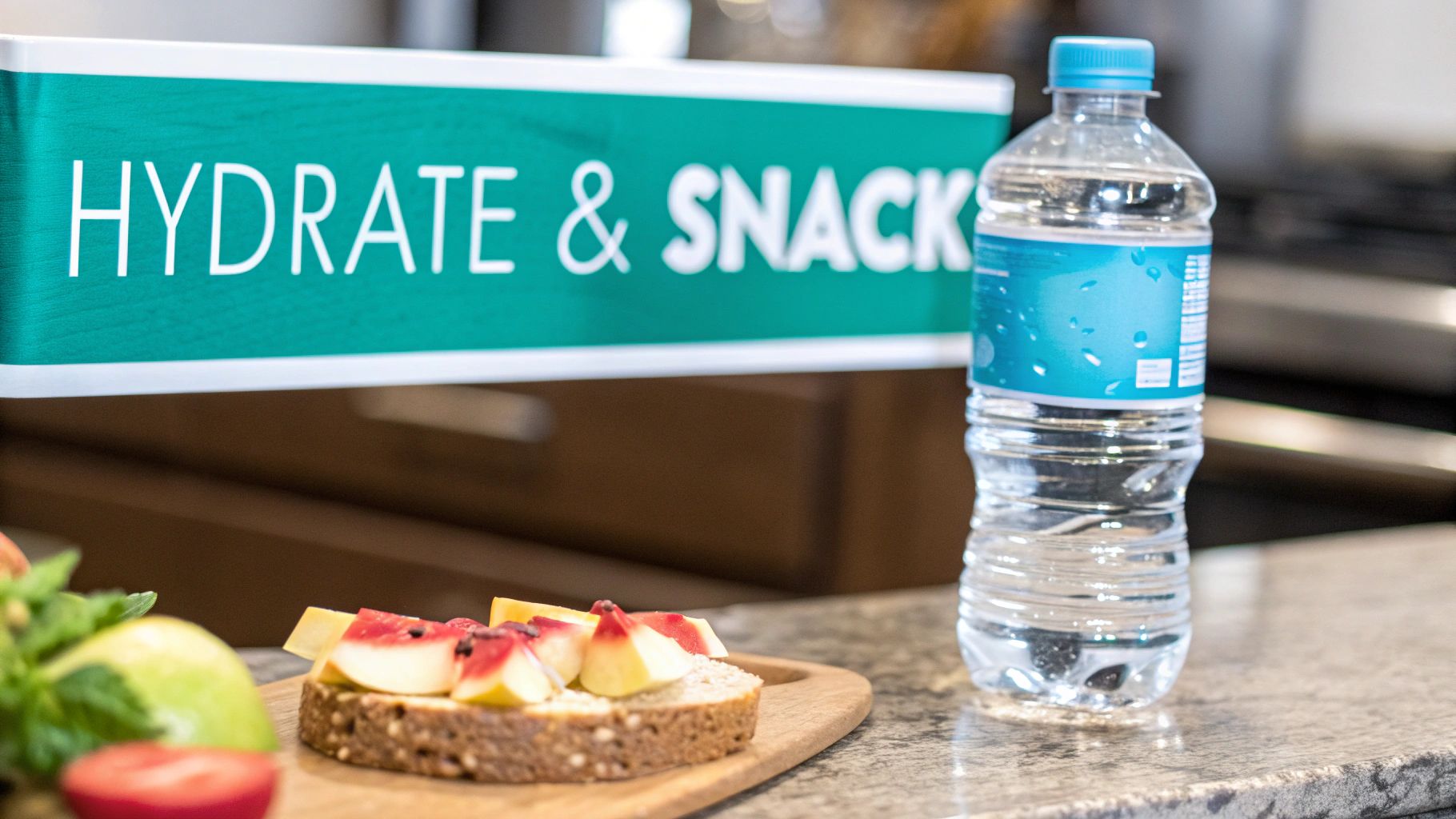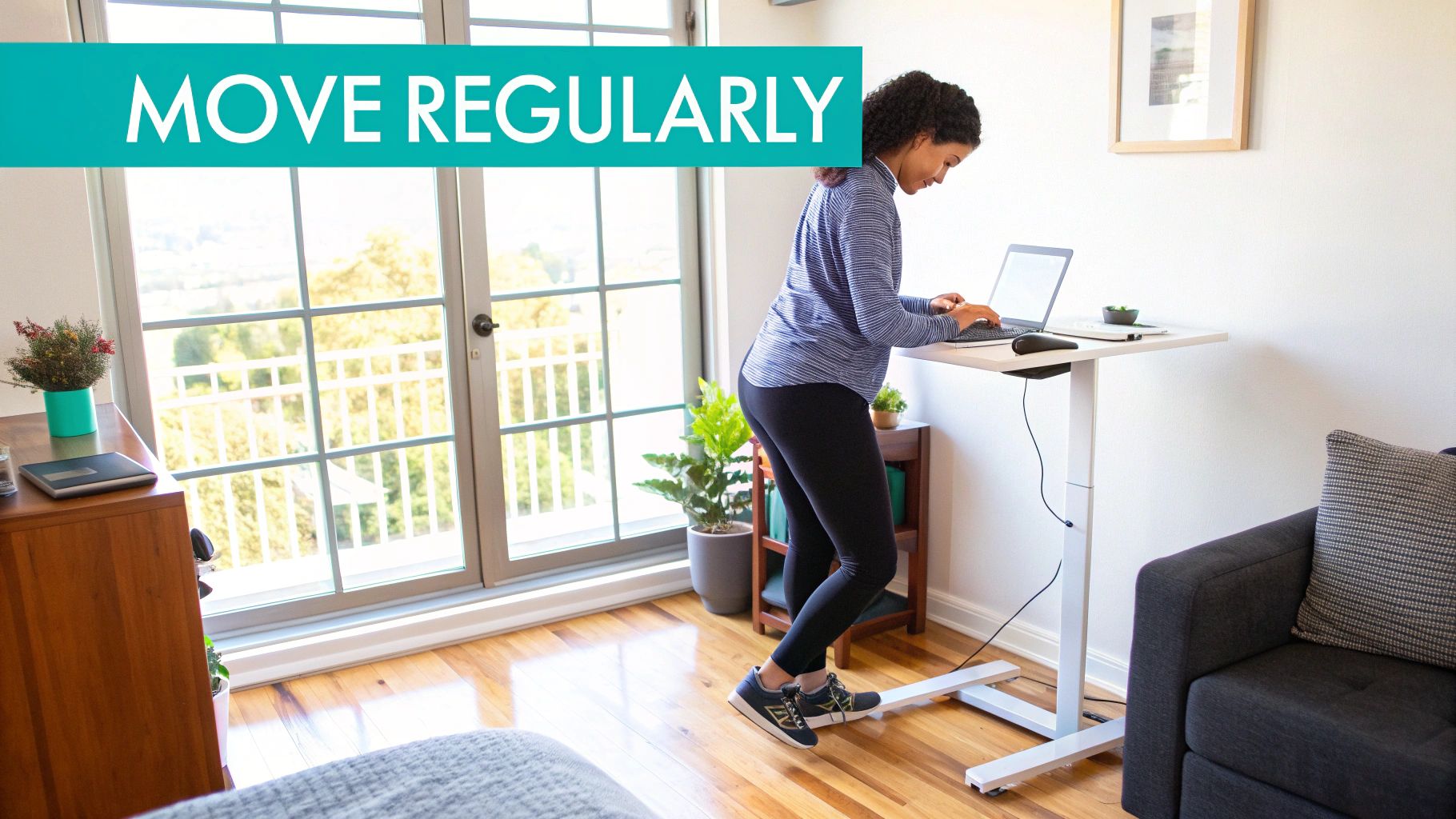

· By Annemarie
How to Function on Little Sleep and Stay Productive
When you’ve barely slept, the first few moments after your alarm blares can make or break the entire day. The real trick isn't just powering through; it's about strategically resetting your internal clock the second you wake up. Get this right, and you can salvage your day before it even really starts.
Your Immediate Survival Plan for the Day Ahead
That alarm after a restless night feels like a personal attack, doesn't it? Your body is screaming for more sleep, but your to-do list is already piling up. Those first couple of hours are absolutely critical. They determine whether you'll just zombie-walk through the day or actually manage to stay sharp and in control. This isn't about mindlessly chugging coffee; it's a strategic triage for your body and mind.
The science here is pretty sobering. Losing just a single night of sleep can tank your alertness by a whopping 32%. And if you're consistently getting by on six hours a night? After two weeks, your brain is performing at the same level as someone who's been awake for 48 hours straight. This hits everything from your reaction time to your ability to make good decisions, which is exactly why a solid morning game plan is a must. If you want to dive deeper, you can discover more about the global impact of poor sleep from recent studies.
Kickstart Your System the Right Way
First things first: get some bright light in your eyes. Natural sunlight is best. Just spend 10-15 minutes near a window or, even better, step outside. This blast of light helps shut down melatonin (the sleep hormone) and tells your brain in no uncertain terms that it's go-time.
Next up, hydrate. You lose a surprising amount of water overnight, and being even slightly dehydrated will make you feel ten times more tired. Gulp down a large glass of cool water right away. For a little extra kick, I like to add a squeeze of lemon or a tiny pinch of sea salt to help replenish some electrolytes.
You have to fight the urge to hit snooze. I know it's tempting, but those broken, low-quality snippets of sleep just make you feel groggier. It’s a phenomenon called sleep inertia. Force yourself up on that first alarm and get your recovery plan in motion immediately.
Your First Two Hours: A Quick-Reference Guide
To make it even easier, here's a simple checklist for what to do—and what not to do—in those first two hours to set yourself up for success.
| What to Do | What to Avoid |
|---|---|
| Get Up Immediately: No snooze button. | Staying in a Dark Room: This keeps melatonin active. |
| Get Sunlight: 10-15 minutes of natural light. | Checking Stressful Emails: Protect your focus early on. |
| Hydrate: A big glass of water is non-negotiable. | Eating Sugary Cereal: You'll crash in an hour. |
| Light Movement: A short walk or simple stretches. | Heavy, Greasy Breakfast: This will just make you sluggish. |
| Wait for Coffee: Delay caffeine for 90-120 minutes. | Chugging Coffee Immediately: Wastes its peak effect. |
Think of this table as your emergency cheat sheet. Follow the "What to Do" column, and you'll give your brain and body the best possible chance to perform, even when you're running on fumes.

As you can see, getting through a sleep-deprived day isn't about one magic fix. It’s a structured approach that starts the moment you wake up and carries you all the way until you can finally get some well-deserved rest.
Fueling Your Body for Sustained Energy

When you’re dead tired, your brain switches to survival mode. It starts screaming for the quickest, easiest energy it can find, which is why that sad-looking donut in the breakroom suddenly seems like a gift from the heavens. This isn't just you lacking willpower; it’s pure biology. Sleep deprivation throws your appetite-regulating hormones completely out of whack, making you crave high-calorie, sugary junk.
Giving in feels great for about ten minutes, but the inevitable sugar crash will leave you feeling even more sluggish and foggy than before. The real secret to learning how to function on little sleep is to outsmart your own biology. Instead of reaching for simple carbs and sugar, your game plan should be a smart combo of lean protein and complex carbs for a slow, steady energy release.
Building a Brain-Friendly Plate
Let’s be real—when your brain feels like scrambled eggs, you’re not about to cook a gourmet meal. You need food that’s nourishing but requires almost zero effort. Think of your meals as tools to keep your blood sugar stable and your mind from completely checking out.
Here are a few dead-simple ideas that actually work:
- Greek Yogurt with Berries and Nuts: A powerhouse of protein, healthy fats, and antioxidants that you can throw together in seconds.
- A Hard-Boiled Egg and an Apple: The egg gives you protein and choline for brain health, while the apple delivers fiber and a hit of natural sweetness.
- A Whole-Wheat Wrap with Turkey and Avocado: This is the perfect trifecta of lean protein, complex carbs, and healthy fats to keep you feeling full and surprisingly focused.
The goal here is simple: avoid those sharp spikes and brutal dips in your blood sugar. A balanced meal with protein, fat, and fiber is your best defense against the mid-afternoon slump that’s practically guaranteed on a sleep-deprived day.
Smarter Hydration and Caffeine Timing
Being tired is stressful for your body, and that stress can burn through your electrolytes faster than usual. Plain water is good, but you can do better. Try adding a tiny pinch of sea salt or a low-sugar electrolyte powder to your water. It helps your body actually absorb the water and supports nerve function, which can make you feel just a bit more switched on.
Finally, you have to be strategic with your caffeine. Instead of chugging a massive coffee first thing in the morning, try sipping on smaller amounts spaced out before 2 PM. This gives you a sustained lift without wrecking your chances of getting the restorative sleep you desperately need later on. It’s the only way to break the cycle of exhaustion.
Managing Your Mindset When You Feel Exhausted
 Functioning on little to no sleep is as much a mental game as it is a physical one. We’ve all been there—that constant, draining worry about how tired you are. This is often called sleep anxiety, and ironically, it can be even more exhausting than the lack of sleep itself.
Functioning on little to no sleep is as much a mental game as it is a physical one. We’ve all been there—that constant, draining worry about how tired you are. This is often called sleep anxiety, and ironically, it can be even more exhausting than the lack of sleep itself.
It’s not just in your head. This anxiety is a real and growing issue, especially with our reliance on sleep-tracking apps that create unrealistic expectations. The Global Wellness Institute has found that around 40% of Gen Z adults now deal with sleep-related anxiety multiple times a week. That's a huge number, and it seriously gets in the way of their day and their ability to recover. You can discover more insights about sleep anxiety trends and see how this is affecting people's well-being.
So what's the move? Instead of trying to power through the exhaustion, you have to work with it. The very first step is to get real and radically adjust your expectations for the day. You are not operating at 100%, and that is completely okay.
Adopt Mental Resilience Tactics
That feeling of being completely overwhelmed when you’re sleep-deprived is a familiar one. In a lot of ways, it feels just like the brain fog you get during a hangover. If you want some tips on managing that kind of mental fatigue, you might find our guide on how to cure a hangover fast useful.
To beat back the mental fog, start by breaking your day into smaller, more manageable chunks. Don't stare at a massive project on your to-do list. Just focus on the very next, tiny step. This simple trick reduces the cognitive load and makes everything feel less impossible.
Don't just push through the fog. Take deliberate micro-breaks. Step away from your screen for three minutes every hour. Look out a window, stretch, or do a quick breathing exercise. This isn't laziness; it's a strategic reset button for your overtaxed brain.
A little mindfulness goes a long way here. The next time you feel that wave of exhaustion wash over you, just take 60 seconds to focus on your breath. Inhale for four counts, hold for four, and then exhale slowly for six. This simple exercise can calm your nervous system right down, giving you a moment of clarity and helping you save that precious mental energy for what actually matters.
Structuring Your Day for Peak Productivity
When you’re running on fumes, your brain just doesn't fire on all cylinders. You can't force yourself through the day with sheer willpower—you have to get smart and strategic. The real secret to functioning on little sleep is treating your energy like the precious, limited resource it is.
And let's be real, you're not alone in this struggle. According to ResMed's Fifth Annual Global Sleep Survey, people around the world are losing almost three nights of good sleep every single week. With 57% blaming stress and 46% pointing to anxiety, it’s no wonder we’re all feeling irritable and unfocused. You can read the full sleep survey findings to see just how widespread the problem is.
Protect Your Peak Focus Windows
Even on the most sleep-deprived days, you probably have a small window or two where your brain feels slightly less fuzzy. For most of us, this happens mid-morning (once the coffee kicks in) or maybe for a brief moment in the early afternoon.
Your most important job is to pinpoint these fleeting moments of clarity and guard them with your life. Block that time off on your calendar. Treat it like the most critical meeting of your day, because it is. This is when you tackle your most demanding, high-concentration work. Everything else can wait.
Stop multitasking. Seriously. When you're tired, your brain can't switch between tasks effectively. Juggling emails, Slack messages, and your actual project will drain your limited energy faster than anything. Pick one thing and give it your full, undivided attention.
Delegate, Delay, or Drop
So, what about everything else on your to-do list? This is where you have to get ruthless. Go through your list and sort every single item into one of three buckets:
- Delegate: What can you hand off? A task for a coworker, a chore for your partner, maybe even something for a virtual assistant. Don't be shy about this.
- Delay: What feels urgent but could honestly wait until tomorrow? Push it back without feeling guilty. You'll be in much better shape to handle it then.
- Drop: What’s on your list out of pure habit? Be honest—some tasks have zero real consequences if they don't get done today. Let them go.
This isn’t about slacking off; it's about being strategic. By clearing your plate of the non-essentials, you save just enough mental fuel to absolutely nail the one or two things that truly matter.
Planning Your Recovery for a Better Tomorrow

Just getting through a sleep-deprived day isn’t the real victory. The real win is breaking the cycle so you don't have to do it all over again. How you wrap up your day is what truly sets the stage for a full recovery, letting you pay back some of that sleep debt you've racked up.
Your main goal here is to send clear signals to your body that it's time for real, restorative rest. This means being just as strategic with your evening routine as you were with your morning survival plan. It's the only way to function on fumes without it becoming a chronic problem.
That completely drained feeling at the end of the day can feel a lot like the aftermath of a big night out. For a little extra help, you can check out these expert tips for a better morning, as many of the principles apply here, too.
The Art of the Power Nap
A power nap can be an absolute game-changer, but get it wrong, and you’ll sabotage your entire night. If you feel like you have to hit the reset button, the secret is to keep it short and early.
Aim for a nap that’s just 20-30 minutes long. This is the sweet spot for boosting alertness and performance without letting you fall into a deep sleep, which is what causes that groggy, out-of-it feeling known as sleep inertia. The best time for this quick recharge is early afternoon, usually between 1 PM and 3 PM, so it doesn't mess with your ability to fall asleep later.
A word of caution: avoid napping after 4 PM at all costs. Napping too late in the day can make it incredibly difficult to fall asleep at your normal bedtime, trapping you in the very cycle of exhaustion you're trying to break.
Designing an Effective Wind-Down Routine
Your brain needs a heads-up that the day is officially over. About an hour before you plan to hit the hay, start a strict screen-free buffer. That blue light from your phone, tablet, and TV is a known enemy of sleep, actively suppressing melatonin production.
Instead, switch to calming, analog activities that tell your body it's time to chill out:
- Read an actual, physical book under dim, warm light.
- Listen to some relaxing music or a podcast.
- Do a few gentle stretches or some light yoga.
- Take a warm bath or shower to help lower your body temperature.
This kind of routine helps your mind disconnect from the day's chaos, making the slide into sleep much smoother and more effective. Remember, it's not just about getting more sleep; it's about getting better quality sleep so you can actually recover.
Got Questions About Running on Fumes?
When you’re staring down a day after a night of tossing and turning, you probably have a lot of questions. We get it. Let’s break down some of the most common ones with answers that are practical, honest, and designed to get you through the day and back on track.
How Bad Is It to Function on Little Sleep Regularly?
Look, we’ve all pulled an all-nighter or had a rough night with a sick kid. Your body can handle that once in a while. But making a habit of it? That’s a whole different ball game.
Chronic sleep deprivation isn’t some badge of honor your body gets used to. Over time, it starts to take a serious toll. We’re talking about a weaker immune system (hello, constant colds), foggy thinking, and a much higher risk for serious health problems down the road, like heart disease and diabetes. Think of sleep loss as a temporary problem to solve, not a new normal to accept.
Can I Really Catch Up on Sleep Over the Weekend?
Sleeping in on Saturday feels like a godsend, and it absolutely helps take the edge off that bone-deep exhaustion. It’s a decent quick fix, but it’s not a magic eraser.
You can pay back some of your "sleep debt," but you can't completely undo the damage of a week of little rest. Things like sharp focus and quick decision-making don't just snap back after one or two long nights in bed. A consistent sleep schedule will always beat a cycle of deprivation and weekend binging. It's a bit like trying to recover from a big night out; for more on that, check out our guide on how to avoid hangovers with 7 tips to feel better fast.
If there's one golden rule for getting through a severely sleep-deprived day, it's this: Do not make any major, life-altering decisions. Your judgment is shot, you can't properly weigh risks, and your impulse control is at an all-time low.
Seriously. That critical conversation, that big purchase, that job offer—if it can wait 24 hours, let it. Your brain simply isn’t firing on all cylinders. Giving yourself that grace period until you've had a full night's rest is one of the smartest things you can do.
When life's celebrations leave you feeling it the next day, Upside has your back. Our Hangover Jelly Sticks are packed with proven, natural ingredients to help you bounce back fast, so you can own the night without writing off your morning. Keep an Upside stick handy and wake up ready for anything. Find out more at https://enjoyupside.com.
